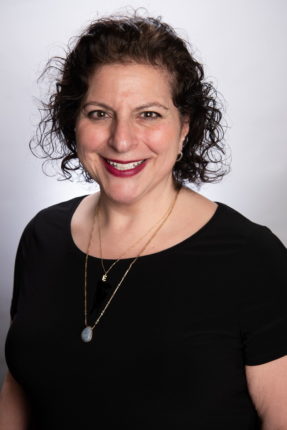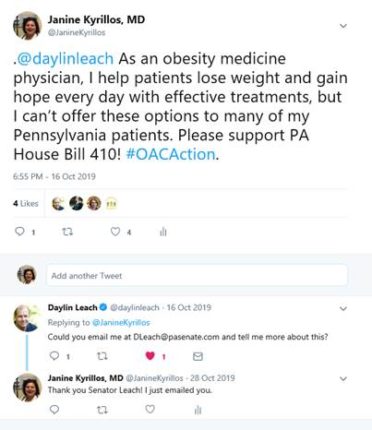If you ever feel like your voice is too small or too quiet to make a difference, think again. If you don’t know a lot about the legislative process, and you’ve decided to hold back on supporting a policy or law that you believe in, think again!

This was the case of Janine Kyrillos, MD, an OAC Member who is also an internal medicine physician specializing in obesity medicine. Dr. Kyrillos has an expert understanding of obesity on a biological level, but she admittedly knows little about the legislative process. However, she wants to – so she’s been leaning on the OAC for guidance in urging lawmakers to support key obesity legislation on behalf of her patients. Read on to hear how one of her efforts really paid off.
It Started with a Tweet
Late last year, Dr. Kyrillos read an email from the OAC encouraging her to reach out to her legislators about supporting a bill in her state of Pennsylvania.
PA House Bill 410 would allow FDA-medications that treat obesity to be covered under the state’s Medicaid program if they were considered medically necessary. At the end of the email, Dr. Kyrillos clicked on a link to “Tweet” her state representatives on social media (Twitter), urging them to support the bill.

Not long after, PA State Senator Daylin Leach sent Dr. Kyrillos a response back, asking her to email him with more information.
His message encouraged Dr. Kyrillos, who followed suit and emailed Senator Leach with a compelling personal story about the importance of expanding access to obesity medications:
Dear Senator Leach,
Thanks so much for replying to my tweet, a couple weeks ago, regarding House Bill 410, which would allow for PA State Medicaid insurance to cover anti-obesity medication when medically necessary.
I am an internal medicine physician with a specialty in obesity medicine, and I treat thousands of patients affected by obesity. We now recognize obesity as a disease, much like asthma or hypertension. Our bodies haven’t evolved quickly enough to deal with the changing food supply and quality, and this is dramatically affecting our health. We also understand that energy balance is very complicated and is not a simple matter of calories. Telling someone with obesity to “eat less, move more” is akin to telling someone with asthma to breathe less so they won’t wheeze as much. Moreover, even if people do eat less/move more, and are able to lose weight, their bodies then accommodate to defend their original weight. Metabolism slows; hunger increases; people regain. This is not a character flaw – this is biology.
There are now more than 6 FDA-approved medications to treat obesity that are safe and effective. While they are not magic, these medications can give people the edge they need to follow a healthy lifestyle and actually lose and maintain a clinically significant amount of weight – even 5-10% of their weight makes a big difference. I also believe these medications are cost effective. Every day, I am able to discontinue treatments such as blood pressure medications, insulin, asthma inhalers, and sleep apnea devices because patients were able to lose weight and improve their conditions. Unfortunately, anti-obesity medication is not covered under PA Medicaid insurance. Therefore I am unable to treat patients with medically necessary medication that I know will improve their health and possibly get them off other medications and treatments. One could say that excluding treatment for obesity is a form of discrimination.
I hope this helps you make an informed move to approve House Bill 410. Please feel free to contact me if you have any other questions or would like to talk more about this.
Senator Leach’s response was positive. He agreed with House Bill 410 and recognized limited obesity treatment as a significant problem in the healthcare system. He then promised Dr. Kyrillos that he would do all he could to support the bill and encourage others to as well.
Encouraged to Take Action on More Obesity Legislation
But Dr. Kyrillos didn’t stop there. After speaking with colleagues and finding inspiration in the OAC, she realized she could do more. We need similar action for access to obesity care on a national level – not just in Pennsylvania.
So, Dr. Kyrillos educated herself on the Treat and Reduce Obesity Act (TROA), which would provide Medicare beneficiaries under part D with meaningful tools to treat obesity such as FDA-approved medication, behavior counseling and more.
Dr. Kyrillos then used the OAC Action Center to email her national PA legislators – urging them not just to vote on TROA, but to co-sponsor it. She wrote a similar email to the one she sent State Senator Daylin Leach, stressing the value in access to life-saving obesity medications from her perspective as a healthcare provider working directly with patients.
Everyday Advocacy Works – Try it!
Dr. Kyrillos was excited to share with the OAC that after sending a letter to her state representatives about TROA, she received a speedy reply. Senator Lloyd Smucker (D-PA) had agreed to co-sponsor obesity legislation, and his senior assistant was writing to deliver the good news.
Here is what Dr. Kyrillos says this experience taught her:
“I clicked on the OAC’s initial email because it was right in front of me and so easy. My thought was that no one would see or pay attention to my tweets or emails. I imagined it would get lost among hundreds or thousands of other messages asking for one thing or another. But I figured if the message presented itself enough times, someone would stop and take notice.
I’m also realizing that timing may be important. What to ask, and when, matters – and it can be very confusing. That’s why it’s so helpful for the OAC and other advocacy organizations to guide us.”
If you’re reading this, maybe you don’t know much about what goes into passing obesity legislation. Maybe you’re passionate about other issues, but you feel like raising your voice will only cause it to get lost in a sea of others.
Standing up for what you believe in can be confusing, scary or intimidating at first – but you might just discover it’s easier than you think. You never know who out there is paying attention and can relate to your message.
Are you interested in taking OAC Action? CLICK HERE to visit our Action Center for all kinds of easy ways to make a difference.
